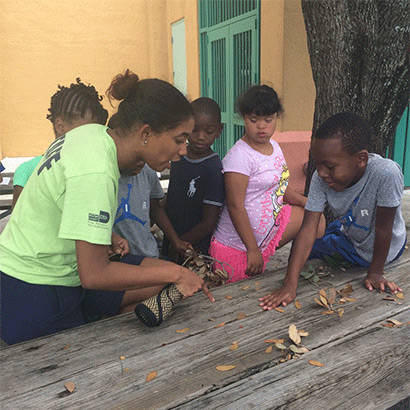
This summer my staff and I were lucky enough to pilot NRPA’s Wildlife Explorers program at a few of our sites in Miami Dade County. Participants in Miami Dade’s recreation program are required to participate in two of what we call “Eco” programs. These “Eco” programs are meant to get the participants interacting with nature, so when we saw the Wildlife Explorers program; we jumped at the opportunity to do something new.
Three of our sites committed to implement the program. One of the sites is located in a suburb of Miami and is really close (less than one mile) to agricultural and rural areas located within Miami Dade. Wildlife at this park is easily observed. The other two program sites, however, are located in the inner city of Miami and are surrounded by very little green space. For me and my staff it was an opportunity to connect kids with habitats and wildlife inhabiting their own park.
For the two groups located in the heart of the city, we felt the programs went amazingly. The children were engaged and looking forward to the next activity. Even though it was hard to observe any wildlife (a squirrel was a rare sighting); the search for wildlife was on.
One of the groups belonged to the Disability Services Group of our parks department, and included children with disabilities. Our staff worked with the recreation therapist to adapt the activities for the group. The adaptations included transcribing some of the information onto their booklets and extensive modeling of the activities. Going outdoors allowed kids to connect some of the concepts in the books to their surroundings.Park management felt that the Wildlife Explorers program is ideal for children in urban and underserved communities but may not be challenging enough for children in suburban communities.
In total, we enabled 131 kids to experience wildlife at their facility. With that many kids, there are sure to be many stories, but one memory stands out the most for me. We had the children lying on the ground in the park by a grassy area near the playground with their eyes closed. Tuning out the noise of city life and listening to the birds or the buzz of a cicada. Just as children began reporting the first sounds they were hearing, a group of older kids came outside and the children started yelling "I hear kids"... "Running"..." I hear playing" ..." I hear fun!" This to me is what nature is supposed to sound like. Thanks to the Wildlife Explorers program for making it easy to expose kids to nature in any outdoor space.
The Wildlife Explorers program is available for anyone to download for free. NRPA will also be hosting a free webinar on December 13, 2016 at 2 p.m. ET to go over best practices. If you start using Wildlife Explorers in your community, be sure to share photos using #WildlifeExplorers on social media.
Robert Carmona isParks and Recreation Manager 2 at Miami-Dade Parks, Recreation and Open Spaces.


